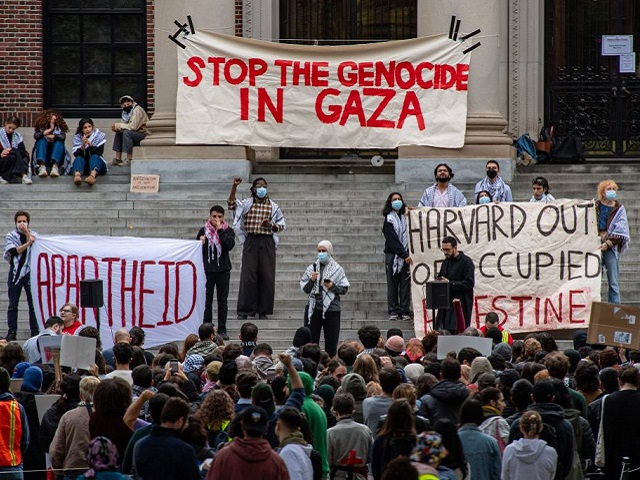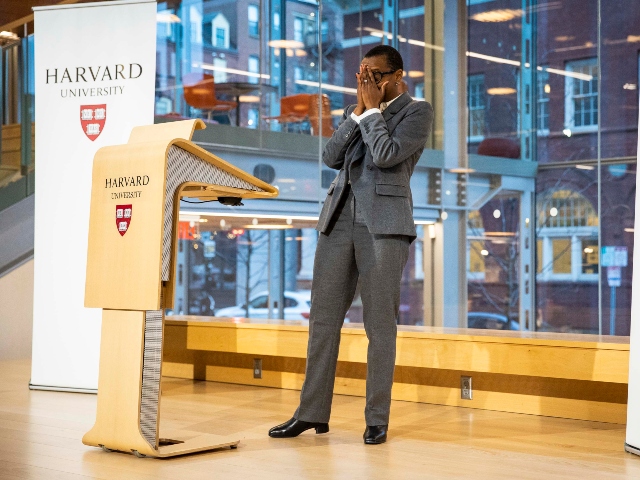Harvard’s early admission applications have dropped to a four-year low as the Ivy League university faces heavy scrutiny over antisemitism scandals that have dominated the school’s news cycle for the past several months.
Harvard has suffered a 17 percent drop in early admission applications, with just 7,921 high school seniors vying to secure their spot at the university, compared to the 9,553 that applied early last year, according to figures released by the school.

Supporters of Palestine gather at Harvard University to show their support for Palestinians in Gaza at a rally in Cambridge, Massachusetts, on October 14, 2023. Thousands of Palestinians sought refuge on October 14 after Israel warned them to evacuate the northern Gaza Strip before an expected ground offensive against Hamas, one week on from the deadliest attack in Israeli history. (Photo by Joseph Prezioso / AFP) (Photo by JOSEPH PREZIOSO/AFP via Getty Images)
That figure is the smallest number since the start of the Chinese coronavirus pandemic, but is still more than the amount of early applications Harvard received in 2017 through 2019.
Meanwhile, Harvard’s competitors, such as Yale University, saw increases in students filling out early admissions applications. On Friday, Yale announced that it had received 7,744 early applicants, the second-largest group of early applicants in the school’s history.
Even the University of Pennsylvania — which has also been under scrutiny for its recent failures involving its response to antisemitism — saw 500 more applications than just one year prior, according to a report by Bloomberg.
Notably, however, the deadline for students to submit early admissions applications was November 1, which was a month before Harvard President Claudine Gay, then-University of Pennsylvania President Liz Magill, and Massachusetts Institute of Technology (MIT) President Sally Kornbluth delivered a disastrous testimony in front of Congress.
During the congressional hearing, the presidents of the three prestigious schools declined to say whether advocating for the genocide of Jews is permissible on campus, which resulted in nationwide backlash. President Magill subsequently resigned.
Harvard, however, has been facing nationwide backlash ever since the October 7 Hamas terrorist attack against Israel, after more than 30 of the Ivy League school’s student groups signed a pro-terror letter attacking Israel in response to the mass murder of Jews by Hamas in Israel.
After first remaining silent on the matter, Harvard leadership issued a vague, generic statement, in which the school failed to pushback against — or even mention — its student groups in question.
After mounting backlash, President Gay then issued a follow-up statement trying to distance Harvard from the student groups who signed the pro-terror joint statement.
After that, Harvard — which has been named 2023’s worst school for free speech by the Foundation for Individual Rights and Expression (FIRE) — ironically issued a third statement stressing the university’s “commitment to free expression,” despite having such a bad record on free speech when it comes to other situations that are not pro-terror.
And then, Gay’s own Ph.D. dissertation was called into question, with scholar Carol Swain, whose work was cited in the Harvard president’s dissertation, telling Breitbart News that Gay “is a fraud” and “an embarrassment,” and that “she should resign.”
You can follow Alana Mastrangelo on Facebook and X/Twitter at @ARmastrangelo, and on Instagram.
